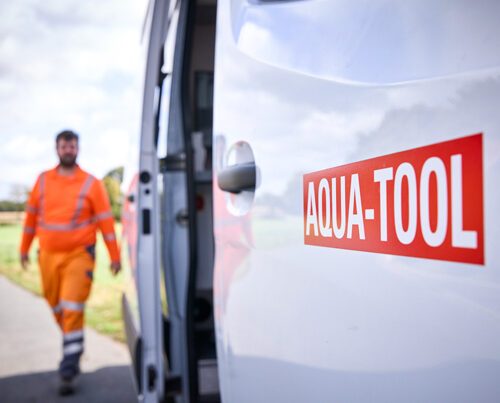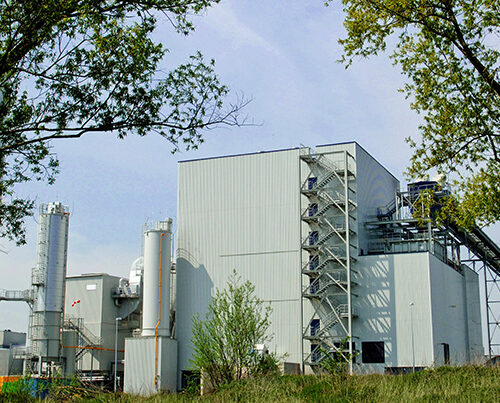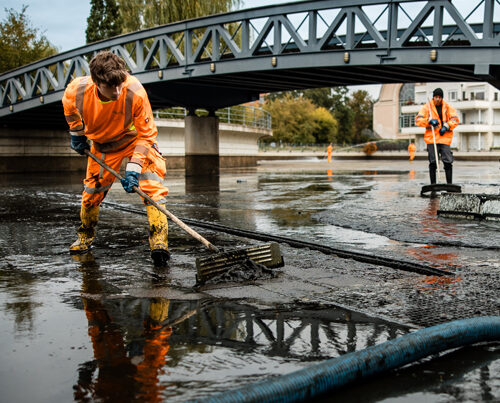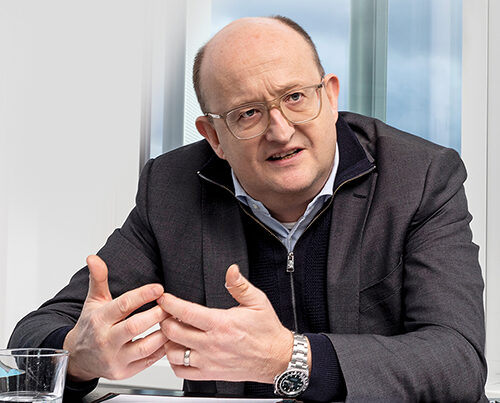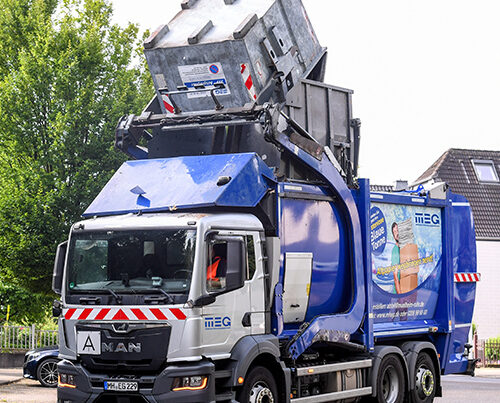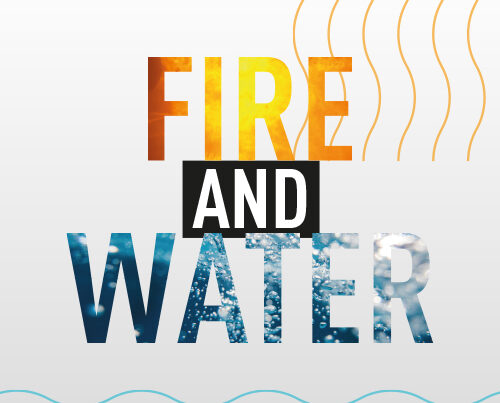With the opening of its own hydrogen filling station at Eichelbuck, Abfallwirtschaft und Stadtreinigung Freiburg (ASF), regional energy supplier badenova and the city of Freiburg are jointly setting an example for sustainable mobility and the municipal energy transition. The filling station is a milestone in the establishment of a self-sufficient hydrogen supply on the site of the former landfill. It is a project that was initiated by ASF in 2022, following the conversion of its municipal waste disposal fleet to alternative drive systems, which began in 2021.
Abfallwirtschaft und Stadtreinigung Freiburg GmbH (ASF) is a public private partnership between the city of Freiburg and REMONDIS.
ASF Solar GmbH, a joint subsidiary of ASF and badenovaWÄRMEPLUS, is responsible for this project. In addition to the new hydrogen filling station, ASF Solar will also be constructing an electrolysis plant at Eichelbuck site from 2026 onwards, whose energy requirements will be largely covered by a photovoltaic system built specifically for this purpose. Green hydrogen will thus be produced directly on site. The concept combines the switch to climate-neutral drives with the development of a dedicated hydrogen infrastructure, thereby laying the foundation for sustainable municipal waste collection in the long term.
The total investment for the entire project amounts to around 8 million euros. Of this, 4.25 million euros in funding has been provided to date: 3 million euros from the City of Freiburg’s Future Fund, 600,000 euros from the State of Baden-Württemberg, 500,000 euros from the Innovation and Technology Promotion Agency (itg) via the trinational ‘Hydrogen Valley Südbaden’ project, and 150,000 euros from the badenova Innovation Fund.
For those involved, the project serves as a beacon, as many steps are being implemented in this combination for the first time and their interaction paves the way for an H₂ future. badenova and ASF are proving to be drivers of the hydrogen ramp-up in the region.
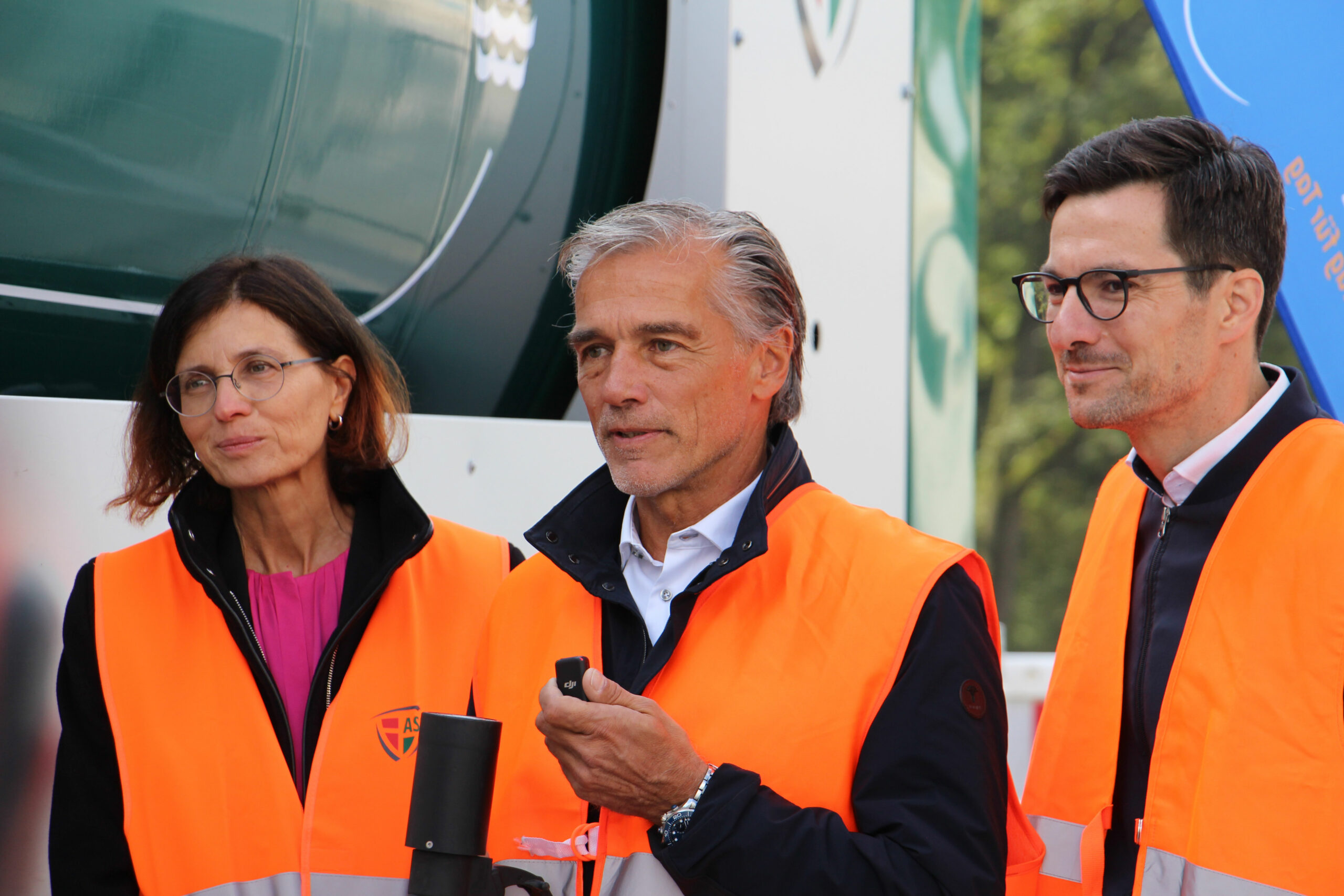
Environment Mayor Christine Buchheit, ASF Managing Director Michael Broglin and Lord Mayor Martin Horn
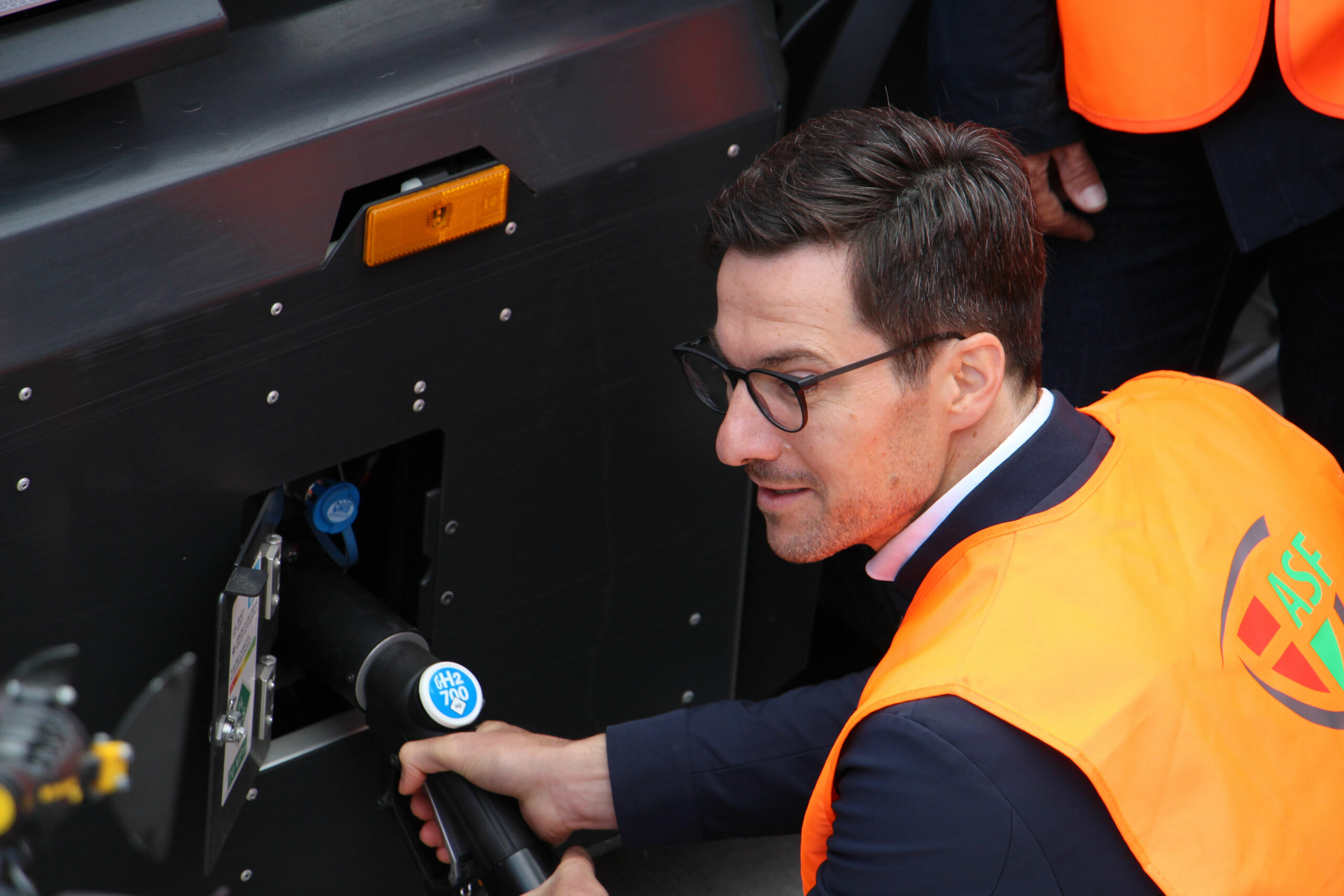
Starting signal for Freiburg’s hydrogen future: Mayor Martin Horn prepares for the first refuelling operation
Climate neutral by 2035
Mayor Martin Horn: “The city of Freiburg, badenova and ASF all want to be climate neutral by 2035. To achieve this, we need courage, a pioneering spirit and very specific projects. But we can only achieve our ambitious goals if we work hand in hand and develop supply and demand in sync, especially when it comes to new topics such as hydrogen. This flagship project combines many of the things that represent our Freiburg spirit and innovation. We have converted ASF’s entire waste collection fleet to fuel cells and are building a PV system and electrolyser on a former landfill site to supply green energy. This will enable the urgently needed transformation to succeed.”
“Green hydrogen will be a key component of the energy transition, as it is the only way to decarbonise many energy requirements,” says Freiburg’s Environment Mayor Christine Buchheit. “The fact that we have now given the green light to produce it locally here makes me feel confident.” The integration with the conversion of the municipal waste disposal fleet to climate-neutral drives, Buchheit continues, gives the project a holistic and particularly progressive character.
“We have always pursued the goal of closing cycles and conserving resources. We are already very successful in doing so with many of the recyclable materials we collect, such as organic waste, waste paper and waste glass. I am therefore all the more delighted that we will also be able to apply this principle of circular economy to our transport services in future: refuse collection vehicles that are no longer powered by fossil fuels but by solar energy and hydrogen – that is climate neutrality in action.”
Michael Broglin, Managing Director of ASF and ASF Solar
badenova CEO Dirk Sattur adds: “The project is a pilot project for badenova: it is our first concrete example of green hydrogen production in Freiburg and paves the way for further decentralised projects. We are one of the most active drivers of the regional hydrogen economy – both in this project and through our involvement in the H₂ core network. We are proud of that.”
“The project impressively demonstrates how close cooperation between local authorities, regional companies and the state of Baden-Württemberg can bring about concrete and successful sustainable transformation,” emphasises Dieter Sommerhalter, Managing Director of itg, pointing to its international relevance. “The ambition to establish a regional hydrogen showcase as a model for Europe is not just a guiding principle here – it is being actively and visibly realised.”
The project
A new solar park covering an area of around 2.4 hectares and with a capacity of approximately 2.6 MWp will be built on the eastern slope of the landfill site in 2025. From 2026, around 40 per cent (2.5 GWh) of the electricity generated there will supply the new electrolysis plant, which will be built by then and will be able to produce up to 140 tonnes of green hydrogen per year. In addition, the electrolysis plant will be operated using a mix of regional and purchased green electricity: approximately 30 per cent (1.6 GWh) will come from regional wind power and another 30 per cent (1.9 GWh) from purchased green electricity. Until the company’s own electrolysis plant goes into operation, the filling station will be supplied with hydrogen from a regional gas supplier. Depending on the price situation, the hydrogen may also be green, especially in summer.
This will be the first H2 production plant for ASF Solar and badenova. It will also be the first production facility of its kind in the Freiburg area.
CO₂-neutral waste collection in Freiburg from 2026
The hydrogen is primarily used to power ASF’s municipal fleet of waste collection vehicles, which has been completely converted to fuel cell vehicles since the beginning of 2025. A total of 22 vehicles are currently on the road, collecting organic waste, paper, yellow bags, residual waste and bulky waste in a climate-friendly manner. Thanks to the economical and independent production of green hydrogen directly on site, CO₂-neutral waste collection will be possible in Freiburg as early as 2026 – without any impact on waste disposal fees for citizens.
The new hydrogen filling station at Eichelbuck complements the existing filling station in Zähringen, thereby ensuring important redundancy for the reliable supply of the municipal vehicle fleet. The facility is dimensioned in such a way that it can supply the existing waste collection fleet and also reliably cover the prospective expansion of the ASF fleet in the coming years.
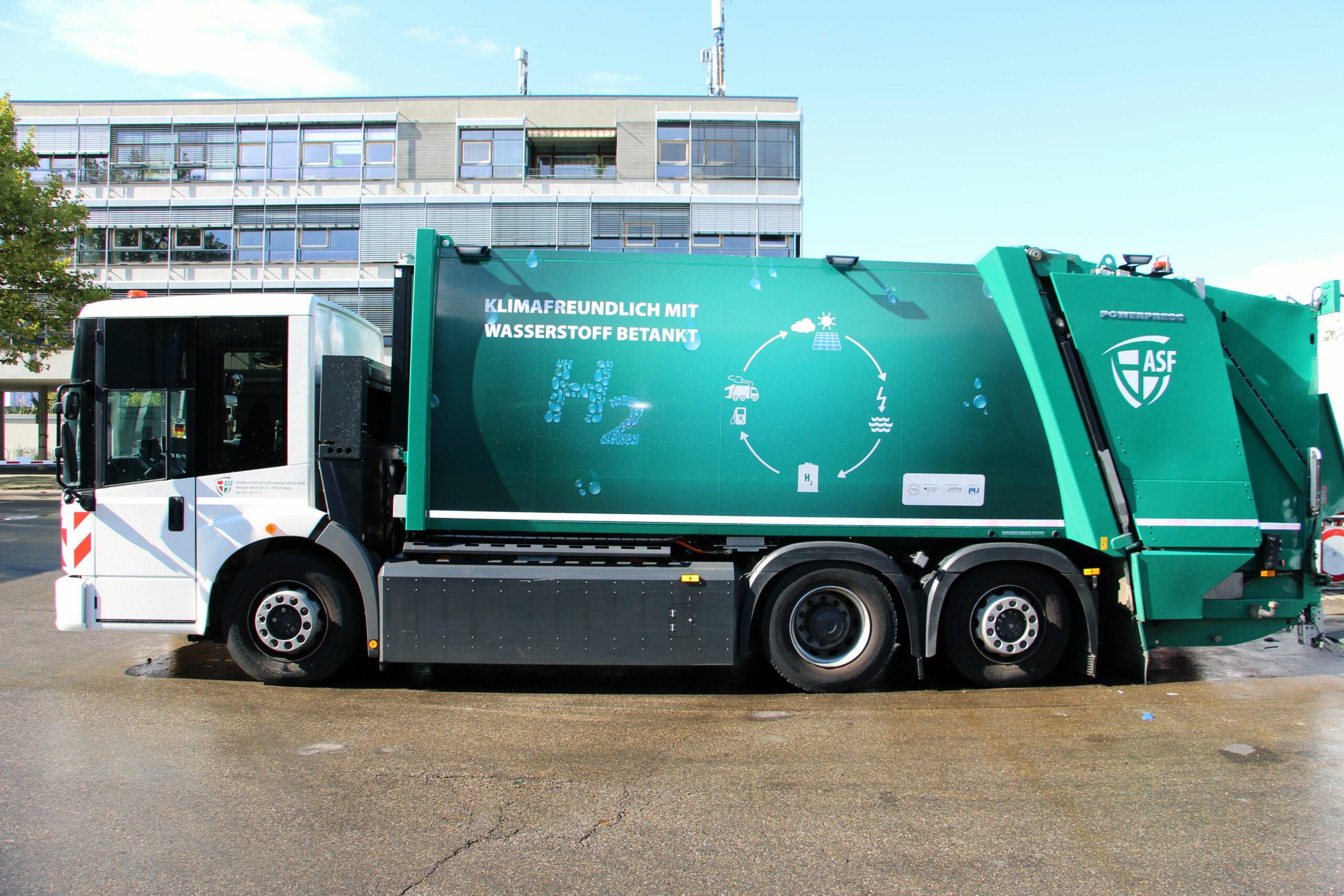
The ASF vehicle fleet runs on hydrogen: 22 fuel cell vehicles are currently in use.
Image credits: © ASF GmbH







